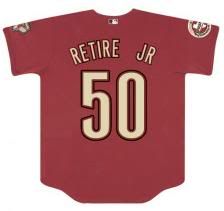|
|
Post by crashtest on Sept 27, 2007 4:41:13 GMT -5
Quote: Matt Murphy, a 21-year-old student and construction supervisor from New York, emerged from a scuffle holding the ball. He said he decided to sell it because he couldn't afford to pay the taxes required to keep it. msn.foxsports.com/mlb/story/7236846?MSNHPHMADo we have any accountants out there that could confirm that purported version of tax law? I just refuse to believe that you have to pay taxes to keep an historic HR ball. Presumably, Craig Biggio has his 3,000th hit ball. Does he have to pay taxes on it to keep it? If you went to a baseball game where something historic happened, would you have to pay taxes on the increased value of your ticket stub? Let's say the Bonds HR happened at Wrigley and the fans dutifully threw the ball back onto the field and it was then given to Bonds. Would he have to pay taxes to keep it? Does Bonds have to pay taxes to keep the bat, jersey, batting helmet, arm guard, jock strap and syringe he was using when he hit it? If Matt Murphy had simply given the ball to the Hall of Fame, would the HoF owe taxes on it? Say you wake up this morning and find a meterorite in your back forty - it turns out to be a chunk of Mars and a research lab values it to be worth millions ("One dealer estimated that the meteorite could sell for $8 to $20 a gram, or somewhere between $108,862 and $272,156. If it had been from the moon or Mars, it would have been worth millions". ) - would you owe taxes on it? Personally, I think you only owe taxes in those situations at the point of sale, not at the point of possession. |
|
|
|
Post by Coach on Sept 27, 2007 8:33:51 GMT -5
I gotta call bullsh*t on this one too, Crash.
|
|
|
|
Post by vega51 on Sept 27, 2007 8:42:33 GMT -5
It should be at the moment of sale.
|
|
|
|
Post by texiban001 on Sept 27, 2007 9:01:02 GMT -5
How could they tax you on the "alleged" value of something in your possession?
I call bullsh*t as well!
|
|
|
|
Post by chandler44 on Sept 27, 2007 11:23:38 GMT -5
Would this maybe be something like when you win a car on the Price is Right and have to pay taxes on it? I really don't know.
|
|
|
|
Post by ikedilligas on Sept 27, 2007 11:33:00 GMT -5
I agree that it should be at the point of sale. A 'collectible' is only worth what someone will pay for it. Until then, it should only be worth it's face value. Now if he claims it as an asset on an insurance policy and puts a 500k value on it then I could see where someone could want to tax that but before he claims a value, it's just like any other $4.95 baseball.
|
|
|
|
Post by dennis2112 on Sept 28, 2007 15:10:37 GMT -5
I think it would only apply during the sale of said item and not before. How would the IRS know he had it or even the value of it. It would have to be appraised to have a value and all he would have to do is deny he has it if even came to that.
|
|
|
|
Post by ikedilligas on Sept 28, 2007 16:58:30 GMT -5
I think it would only apply during the sale of said item and not before. How would the IRS know he had it or even the value of it. It would have to be appraised to have a value and all he would have to do is deny he has it if even came to that. I have heard from numerous people, that when dealing with the IRS, you are guilty until proven innocent. As is the case with Audits. If you get audited, you have to prove you are right. They don't have to prove you are wrong. Or they can impose all kinds of crap against you. This come from at least two friends who have been CPA's for over 30 years. |
|
|
|
Post by crashtest on Sept 28, 2007 17:38:58 GMT -5
online.wsj.com/article/SB118532191532076935.htmlEven the WSJ doesn't know the answer. This article covers just about all of my hypotheticals, including the idea of the fan GIVING the historic ball back to the slugger. The issue actually came up during the Mark McGwire pursuit of Roger Maris' 61*. Hold on to your seats now - The initial IRS ruling was that the charitable FAN would be hit with a GIFT TAX. THE FAN for crissakes. Howls of protests caused an amended ruling, but it is unconscionable that such synapses fired in the first place. Quote: In the summer of 1998, a tax tempest flared up when St. Louis Cardinals slugger Mark McGwire was on the verge of smashing Roger Maris's single-season record of 61 homers. At the time, a reporter asked an IRS spokesman what might happen if the fan who caught the record-breaking ball gave it back to Mr. McGwire as a gift. The IRS spokesman replied that the fan could get hit with a hefty gift tax. That response produced howls of protest from the halls of Congress, as then-IRS commissioner Charles Rossotti recalls vividly. "More than innocent-spouse cases, more than small-business owners losing their businesses, more than IRS modernization failures, the prospect of the IRS taxing this hypothetical good-hearted fan unleashed the fury of the American people, not to mention their representatives in Congress," Mr. Rossotti wrote in his memoir, "Many Unhappy Returns." The IRS quickly reversed itself. Mr. Rossotti issued a statement saying that if a fan caught the ball and gave it back to Mr. McGwire, the fan wouldn't be taxed. "Sometimes pieces of the tax code can be as hard to understand as the infield fly rule," Mr. Rossotti explained. "All I know is that the fan who gives back the home-run ball deserves a round of applause, not a big tax bill." Quote: Common sense might suggest the answer is simple: The lucky fan who catches the historic ball shouldn't owe tax until he or she sells it. But relying on common sense to interpret tax laws can often lead to trouble. Asked whether any fan who has ever caught a valuable home-run ball has had to pay tax on it before selling it, an IRS official declines comment. Some professors, such as Alice Abreu of Temple Law School, feel strongly the answer is clear. "It's taxable income" to the fan the instant that person catches the ball, Prof. Abreu replies. How come? "It's accession to wealth," and nothing in the tax code specifically exempts from taxation a Barry Bonds-propelled baseball. Lawyers say this view logically stems from cases saying that someone who finds a "treasure trove" owes tax on it right away. But other lawyers disagree. They also say it's highly unlikely that the IRS would be willing to risk the wrath of a baseball-loving nation by taxing the fan right away. **** It looks like that meteorite in your back forty would cost you a "treasure trove" bundle. Say it killed your prized bull worth $500,000 in semen sales. sports.yahoo.com/top/news?slug=jo-bulls110506&prov=yhoo&type=lgnsYou could bet your sweet a$$ you probably couldn't claim a tax deduction for the tragedy.
|
|
|
|
Post by dennis2112 on Sept 28, 2007 21:02:17 GMT -5
I have heard from numerous people, that when dealing with the IRS, you are guilty until proven innocent. As is the case with Audits. If you get audited, you have to prove you are right. They don't have to prove you are wrong. Or they can impose all kinds of crap against you. This come from at least two friends who have been CPA's for over 30 years. I certainly understand that but you can't tax something that you don't have or have not sold yet. Just because you own a car does mean you pay taxes on it until you sell it then you would pay taxes on what you earned from it. Just because he owns the ball does not make it taxable. |
|
|
|
Post by sadoug on Sept 28, 2007 21:58:29 GMT -5
yeah...but this is the IRS....if an unscrupulous contractor turns in a false 1099 on you claiming he paid you 20,000 just to make his own taxes go down, the IRS will come after you for failure to report income.....and you have the burden of proving you did not get that money, which is of course impossible to do.....None of your bank records mean anything...you owe the tax.
|
|
|
|
Post by crashtest on Sept 29, 2007 5:14:46 GMT -5
I have heard from numerous people, that when dealing with the IRS, you are guilty until proven innocent. As is the case with Audits. If you get audited, you have to prove you are right. They don't have to prove you are wrong. Or they can impose all kinds of crap against you. This come from at least two friends who have been CPA's for over 30 years. I certainly understand that but you can't tax something that you don't have or have not sold yet. Just because you own a car does mean you pay taxes on it until you sell it then you would pay taxes on what you earned from it. Just because he owns the ball does not make it taxable. That is not the proper analogy. When you buy a car, you pay taxes on it at the point of sale. If you own a house, you pay property taxes on it every year. I thought the Constitution protected us against unreasonable searches and seizures. EVERY reasonable person feels it is simple common sense that a fan would owe taxes on an historic HR ball only at the point of sale. Yet an erudite law professor can argue above "Some professors, such as Alice Abreu of Temple Law School, feel strongly the answer is clear. "It's taxable income" to the fan the instant that person catches the ball, Prof. Abreu replies. How come? "It's accession to wealth," and nothing in the tax code specifically exempts from taxation a Barry Bonds-propelled baseball. Lawyers say this view logically stems from cases saying that someone who finds a "treasure trove" owes tax on it right away". Fine. That's a great way to counter the absurd salaries given to professional athletes. How much do you think a "game-worn" Roger Clemens jersey would sell for? Then tax Roger for EVERY game worn jersey in his possession. How much would any of his personal memorabilia sell for? ---tax every "K" ball or "W" ball on his mantle. Make the club pay a "hefty gift tax" for letting him have it in the first place. Make Debbie pay taxes on every autographed "pink mink" Jacket Happy Happy Jacket in her inventory. |
|









